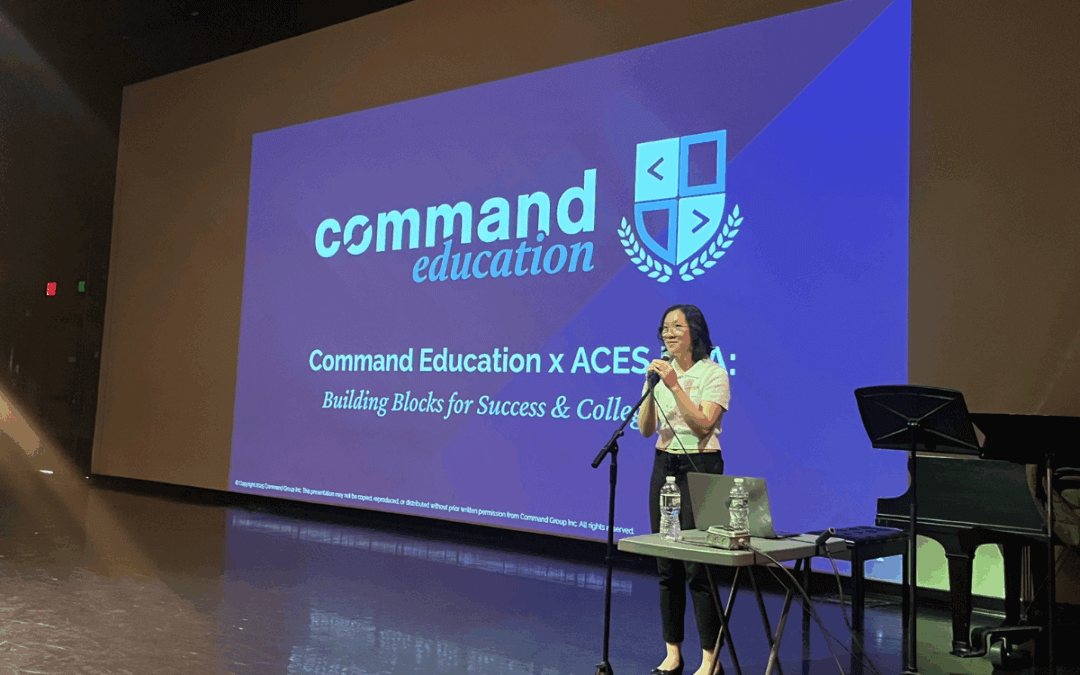For many students, the SAT and ACT are the most challenging and anxiety-inducing elements of the college admissions process. With top schools reinstating testing requirements, standardized tests have regained their importance in admissions decisions. This not only increases pressure on students, but the tests’ unique format can pose additional challenges, as it differs significantly from regular high school tests. With all of this in mind, rigorous preparation is critical for students to reach their goal scores.
Every admissions cycle, Command Education Senior Tutors help students discover their learning styles and adapt their study practices to ensure effective preparation and deepen comprehension. Regardless of a student’s academic background, testing proficiency, or collegiate goals, we empower students to create reasonable yet ambitious goals and support them every step of the way as they strive to achieve them. Below, Senior Tutor Srinija shares insights about how our Senior Tutors equip students to put their best foot forward on standardized tests.

What constitutes a low test score?
Srinija: I generally define a low test score as anything under 1200 on the SAT or below a 28 on the ACT, but I think it’s important to emphasize that “low” is always relative to the student’s individual goals and the schools they’re aiming to apply to. A score that feels strong to one student could be considered low for another.
For example, if a student’s dream school admits students with a median SAT score of 1500, then a 1420—even though that’s generally considered a solid score—might not be competitive. In other words, low scores aren’t one-size-fits-all. Some students may feel disappointed by a 1400 if they’ve set their sights on a very selective program, while for others a 1400 is a dream score that represents tremendous progress. When I think about test scores, I focus less on the number itself and more on what it means in relation to the student’s aspirations. That framing helps me determine how to structure a plan going forward.

How long do you work with students before they sit for the exam?
Srinija: The length of the test prep process really depends on a student’s starting point and how consistently they are able to commit to the work. Factors like how often we meet, whether homework is completed on time, and how much independent practice the student is doing outside of sessions all play a big role. Some students make quick progress because they already have a strong foundation, while others need more time to build up core skills before moving on to higher-level strategies.
If a student is starting fresh, meaning they haven’t taken any official exams yet, it typically takes at least two months before we’re ready for them to sit for their first real test. For those aiming for more significant score increases, especially if their initial diagnostic is much lower than their goal, the timeline is longer. In those cases, test prep should be approached as a long-term process, typically spanning six months, with the early months focused on content mastery and the later months devoted to timed practice and fine-tuning strategies. Ultimately, the most important thing is consistency.

How do you help students improve their standardized test scores?
Srinija: When I work with students who start out with lower scores, my first priority is always building a strong content foundation. In my experience, the biggest obstacle for these students is that they haven’t had the chance to fully master the material that the SAT or ACT tests. Both tests cover a wide range of concepts from several years of high school, and if a student has gaps in grammar knowledge, reading comprehension, or math skills, it can make the test feel overwhelming. For this reason, I start by going back to the basics. I want to make sure a student can confidently handle the fundamentals—whether that’s recognizing subject-verb agreement in English or understanding linear equations in math—before moving on to more advanced material. Once those building blocks are in place, it’s much easier for students to see how the pieces fit together and to start learning higher-level strategies.

Do students who struggle with executive functioning skills score lower on the SAT and ACT? How can students improve these skills?
Srinija: In many cases, students who struggle with standardized testing often face challenges with executive functioning skills, such as staying organized, managing their time, or following through on a study plan. These skills are just as important as content knowledge, and when they’re underdeveloped, it can make test prep feel harder than it needs to be.
One of the ways mentors can really help is by holding students accountable in a supportive way. This might mean helping them create study calendars or weekly checklists, breaking big tasks into smaller, achievable goals, and then checking in frequently to track progress. Celebrating small wins is key. The more successes a student experiences, the more motivated and confident they will feel about tackling the next step. Even simple encouragement, like telling a student you’re proud of the effort they’ve put in, can go a long way in building momentum. Parents can also play a constructive role here by reinforcing these habits at home. They can provide structure by setting consistent study times, encouraging breaks to prevent burnout, and recognizing when their child meets a milestone.

How do Command Education Senior Tutors help students build motivation?
Srinija: Motivation is often one of the biggest challenges in test prep, especially for students who feel overwhelmed at the start. My approach is to be honest and direct about what the process requires. Standardized testing demands consistent effort, and real progress can only come from the student’s commitment. At the same time, I make sure they know I’m fully invested in their journey and I’m right there celebrating each step of their progress along the way.
I’ve found that setting clear expectations gives students a sense of security because they know exactly what’s expected and how success will be measured. I establish realistic, concrete goals for each session and homework assignment. For example, with a high-achieving student, I might set the goal of running an English section that week. We map out a clear plan, and I check in regularly to ensure we’re on track. When students feel especially unmotivated, I bring the focus back to the bigger picture. I remind them that this test is just one step toward their larger goals of gaining admission to a dream college. Anchoring the work in that “why” helps students push through the day-to-day grind with greater purpose and persistence.
With consistent, expert support through the testing process, students not only see measurable improvements in their scores, but also build habits of focus, confidence, and perseverance that will carry them into college and beyond. If you’re ready to help your student achieve their goal score and master critical academic skillsets, schedule your free consultation today to learn more about working with a Command Education Senior Tutor.











